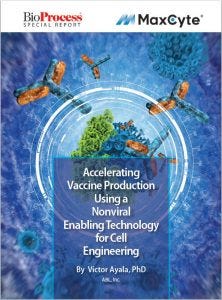- Sponsored Content
- Vaccines
Accelerating Vaccine Production Using a Nonviral Enabling Technology for Cell EngineeringAccelerating Vaccine Production Using a Nonviral Enabling Technology for Cell Engineering
June 22, 2018
Sponsored by MaxCyte
 At the recent World Vaccine Conference, Victor Ayala, PhD, an early stage investigator with Advanced BioScience Laboratories, Inc. (ABL), discussed how to accelerate vaccine production using a nonviral enabling technology for cell engineering. ABL is a contract research/manufacturing organization (CRO/CMO) providing manufacturing and laboratory research services to advance leading vaccines and therapies from clinical development to the commercial market. The company has been conducting R&D research for over 55 years and performing CMO manufacturing for over 25 years. With more than 200 employees worldwide, ABL has sites in Rockville, MD, as well as Strasbourg and Lyon, France. Services include preclinical and clinical immunobiology services, product development, and biomanufacturing. The following are highlights of Dr. Ayala’s presentation.
At the recent World Vaccine Conference, Victor Ayala, PhD, an early stage investigator with Advanced BioScience Laboratories, Inc. (ABL), discussed how to accelerate vaccine production using a nonviral enabling technology for cell engineering. ABL is a contract research/manufacturing organization (CRO/CMO) providing manufacturing and laboratory research services to advance leading vaccines and therapies from clinical development to the commercial market. The company has been conducting R&D research for over 55 years and performing CMO manufacturing for over 25 years. With more than 200 employees worldwide, ABL has sites in Rockville, MD, as well as Strasbourg and Lyon, France. Services include preclinical and clinical immunobiology services, product development, and biomanufacturing. The following are highlights of Dr. Ayala’s presentation.
When it comes to protein expression, manufacturers have a choice among a range of technologies for implementation. However, such systems all fall into one of two basic categories: stable cell lines or transient transfection. Industry and regulatory agencies prefer stable cell lines because they provide product consistency. They are well-characterized systems, and the source of production is indefinite. But using stable cell lines can be expensive and time consuming. Researchers want to fire off as many candidate biologics as possible, especially in early phases of discovery or development. If that process is so burdened that it becomes inhibitory to execute, it slows the development train and ultimately increases the medical costs associated with preventable diseases.
An alternative method is to use transient transfection, which can be low-cost and high-yielding. One major advantage to using this approach over generating a cell line is that it elminiates the need for generating a master cell-bank (MCB) every time you want to manufacture a drug molecule. Shortcomings of using transient transfection include a finite production of proteins, inefficiencies with Chinese hamster ovary (CHO)cells (the cell line preferred by industry for antibodies and recombinant glycoproteins such as HIV envelopes), and concerns about product variability.
The MaxCyte flow electroporation technology has been a breakthrough technology for ABL in many areas of research. We have been working with MaxCyte for over five years and currently use the STX and VLX systems in process development (PD) and manufacturing. ABL recently purchased an additional STX unit for R&D work to bridge the gap between product innovation and PD.
Just fill out the form to view and download the complete eBook.
You May Also Like






